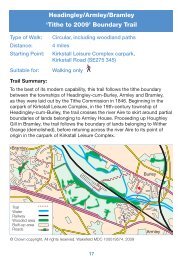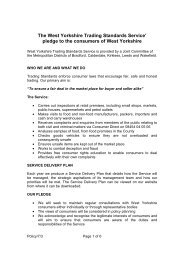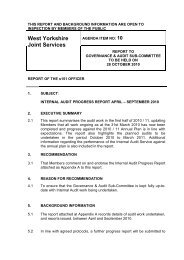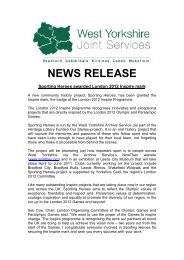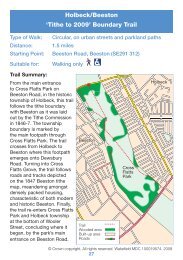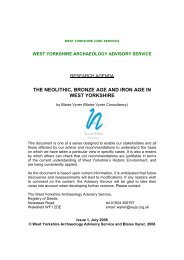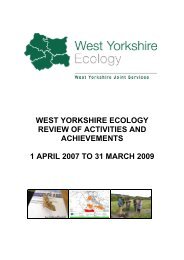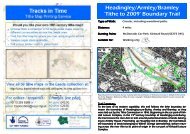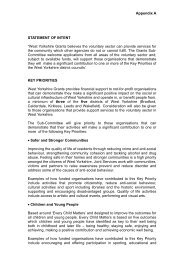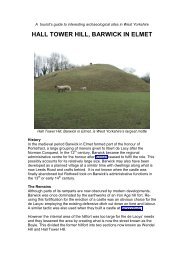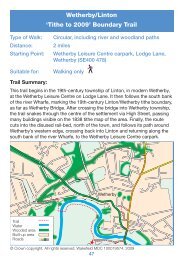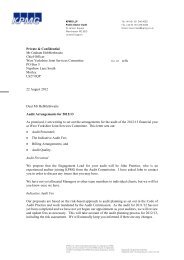Collections Guide - West Yorkshire Joint Services
Collections Guide - West Yorkshire Joint Services
Collections Guide - West Yorkshire Joint Services
You also want an ePaper? Increase the reach of your titles
YUMPU automatically turns print PDFs into web optimized ePapers that Google loves.
food and clothing to us whilst interned in enemy countries. By this means the assistance from home whichwas absolutely necessary to prevent starvation, owing to the scanty nourishment provided by the enemyauthorities, was assured.'Front Line/Military Service(PI:28-51,70/1) c1910 – 1987 Gertrude Bell – served with the British Intelligenceduring the First World War and joined the Mesopotamia Expeditionary Force inBasra and BaghdadGertrude Lowthian Bell was born in Washington, County Durham, in 1868. Her father, Sir Thomas Hugh Bell,was the son of Sir Isaac Lowthian Bell, the industrial metallurgist, whilst her mother was Mary Shield, thedaughter of John Shield of Newcastle upon Tyne. Her mother died in 1871 and Hugh Bell subsequentlymarried Florence Olliffe, the daughter of Sir Joseph Olliffe. Gertrude Bell was educated at Queen's College,London and at Lady Margaret Hall, Oxford, where she obtained a first class degree in modern history in1888. In the years following, she spent time on the social round in London and <strong>Yorkshire</strong>, travelledextensively in Europe, and visited Persia. Her travels continued with two round the world trips in 1897-1898and in 1902-1903. In the seasons 1899-1904, her climbing exploits in the Alps earned her renown as amountaineer. From the turn of the century, her life was governed by a love of the Arab peoples, inspired, itseems, by a visit to friends in Jerusalem in 1899-1900. She learned their language, investigated theirarchaeological sites, and travelled deep into the desert, accompanied only by male guides. She learned tospeak Persian and Arabic and wrote about her archaeological findings and her travels. Bell's knowledge ofthe region led her into service with the British Intelligence during the First World War where she workedunder Sir Percy Cox and Sir Arnold Wilson. In 1915 she was appointed to the Arab Bureau in Cairo, whichwas involved in gathering information useful for mobilising the Arabs against Turkey. She also joined theMesopotamia Expeditionary Force in Basra and Baghdad. In 1920, she became Oriental Secretary to theBritish High Commission in Iraq and was influential in establishing the Hashimite Dynasty when Faisal Ibecame the first king of Iraq in 1921. Her first love, however, was always for archaeology, and between 1923and 1926, as Honorary Director of Antiquities in Iraq, she established the Iraq Museum in Baghdad. GertrudeBell died on 12 July 1926 in Baghdad, where she was buried. Her most important works include SafarNameh: Persian pictures (1894); Poems from the Divan of Hafiz (1897); The desert and the sown (1907);The thousand and one churches by William M. Ramsay and Gertrude Bell (1909); Amurath to Amurath(1911); Churches and monasteries of the Tûr 'Abdîn and neighbouring districts (1913); Palace and mosqueat Ukhaidir : a study in early Mohammadan architecture (1914); The Arab of Mesopotamia (1917); Review ofthe civil administration of Mesopotamia (1920).(WT:80) 1915 Plans of scheme for destroying Zeppelins by Mr Holroyd Smith



